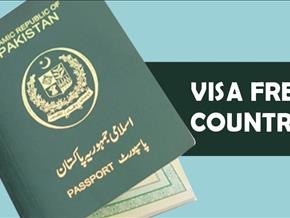.webp)
Islamabad, Pakistan & Kuwait City, Kuwait – In a momentous diplomatic breakthrough, the State of Kuwait has officially lifted its 19-year visa ban on Pakistani citizens, marking the end of a long hiatus that profoundly impacted bilateral relations, economic ties, and the lives of countless individuals. This historic decision, announced recently, signifies a new era of cooperation and opens up a vast array of opportunities for Pakistanis seeking employment, business, tourism, and family reunification in the oil-rich Gulf nation. The resumption of Kuwaiti visas for Pakistanis is expected to usher in a new wave of prosperity and strengthen the long-standing fraternal bond between the two nations.
This comprehensive article will delve into the profound implications of this decision, exploring the historical context of the Kuwait visa ban, the various visa categories now available for Pakistanis, the anticipated economic impact on both countries, the significant opportunities for manpower export from Pakistan to Kuwait, and the renewed hopes for the Pakistani community in Kuwait. We will also discuss the streamlined online visa application process and the future outlook for Pakistan-Kuwait relations.
1. The End of a Long Hiatus: Kuwait Lifts Visa Ban
The news that Kuwait has ended its visa ban on Pakistanis after 19 years has been met with widespread relief and jubilation across Pakistan. For nearly two decades, Pakistani nationals faced severe restrictions on entering Kuwait, a country that once hosted a thriving Pakistani expatriate community. This ban had created considerable hardship for families separated by borders and significantly curtailed economic opportunities for Pakistan's workforce. The decision to resume visa access is a clear indication of improving diplomatic relations and a renewed focus on mutually beneficial partnerships.
1.1. The Historical Context: 19 Years of Restriction
The Kuwait visa ban on Pakistanis was initially imposed in 2011, although reports suggest the restrictions began earlier, with some sources citing a hiatus closer to 19 years. This comprehensive ban also reportedly included citizens from Iran, Syria, and Afghanistan, primarily due to unspecified security concerns at the time. For almost two decades, Pakistani citizens found it exceptionally challenging to obtain any type of Kuwaiti visa, severely limiting travel for work, family visits, business, or tourism.
During this period, despite numerous diplomatic efforts by successive Pakistani governments, the visa restrictions remained largely in place. The ban had a tangible impact on the traditional flow of Pakistani workers to Kuwait, forcing many to seek opportunities elsewhere and affecting the volume of remittances to Pakistan from this crucial Gulf market. The lifting of the visa ban is, therefore, not just a procedural change but a restoration of a vital historical connection and a testament to persistent diplomatic engagement.
1.2. Diplomatic Breakthrough: A New Chapter
The recent announcement signals a major diplomatic breakthrough. Pakistan's Ambassador to Kuwait, Dr. Zaffar Iqbal, has been instrumental in these developments, confirming that the Kuwaiti government has formally resumed the issuance of various types of visas to Pakistani citizens. This decision is part of a broader effort to bolster bilateral relations and address critical labour needs in Kuwait, particularly in sectors where Pakistani expertise is highly valued. The Ministry of Overseas Pakistanis has also lauded this development, highlighting its significance for thousands of Pakistanis.
The lifting of the Kuwait visa ban has been described as a "historic moment" by officials from the Ministry of Overseas Pakistanis, crediting both the Kuwaiti government and the Ministry's tireless efforts in restoring visa access for Pakistani citizens. This positive step is anticipated to pave the way for increased collaboration across various sectors, ranging from economic partnerships to cultural exchange.
2. Types of Kuwaiti Visas Now Available for Pakistanis
With the visa ban lifted, Pakistani nationals can now apply for a wide array of Kuwaiti visa categories, addressing various travel purposes. This comprehensive opening up of visa services will cater to a diverse range of applicants, from skilled workers seeking employment to families wishing to reunite, and tourists eager to explore Kuwait's rich heritage. The Kuwaiti government has opened channels for:
- Work Visas: This is arguably the most impactful category, set to unlock vast employment opportunities for Pakistani professionals and skilled, semi-skilled, and unskilled workers.
- Family Visit Visas: This allows Pakistanis to visit their relatives residing in Kuwait, fostering family reunification and strengthening social ties.
- Business Visas: Facilitates trade and investment, enabling Pakistani entrepreneurs and business delegates to explore and expand commercial ventures in Kuwait.
- Tourist Visas: Opens up Kuwait as a new travel destination for Pakistani tourists, encouraging cultural exchange and tourism revenue.
- Commercial Visas: Similar to business visas, these cater to specific commercial activities or contract-related visits.
Additionally, while not explicitly highlighted in the initial announcement, standard Kuwaiti visa categories typically include:
- Dependent Visas: For family members (spouses, children) accompanying a primary visa holder who is employed in Kuwait.
- Transit Visas: For individuals transiting through Kuwait to another destination.
- Student Visas: For Pakistani students pursuing educational opportunities in Kuwaiti institutions.
The availability of these diverse visa types signifies a comprehensive reopening of avenues for Pakistanis to travel and reside in Kuwait, reflecting a full normalization of visa procedures.
3. Streamlined Visa Application Process: Online Portal
A significant aspect of this new policy is the modernization of the visa application process. All types of Kuwaiti visas can now be obtained through an online platform, making the application process significantly easier, faster, and more transparent for Pakistani citizens. This shift to digital processing is a welcome change, eliminating previous bureaucratic hurdles and lengthy waiting periods.
3.1. Efficiency and Speed
According to the Ministry of Overseas Pakistanis, the online visa application process could be remarkably swift, with processing times potentially as short as one minute and up to a maximum of 24 hours, depending on the visa category. This efficiency is a stark contrast to the previous difficulties and uncertainties associated with obtaining Kuwaiti visas. The digital platform is designed to handle a high volume of applications, ensuring that the demand from Pakistan is met effectively.
3.2. Key Requirements for Online Application
While specific detailed requirements for each Kuwaiti visa type will be available on the official online portal or through the Kuwaiti Embassy/Consulate, general requirements for online visa applications typically include:
- Valid Passport: A clear scanned copy of the passport's information page, with validity extending at least six months beyond the intended stay.
- Passport-sized Photograph: A recent digital photograph meeting specific dimensions and background requirements.
- Completed Application Form: Electronically filled and signed application form.
- Proof of Accommodation: Hotel reservations for tourist visas, or details of sponsor's residence for family visas.
- Travel Itinerary: Confirmed flight bookings (round trip for tourist/visit visas).
- Employment Contract/Invitation Letter: For work and business visas, respectively.
- Medical Certificate and Test Results: For work and residency visas, often requiring tests for communicable diseases like Hepatitis B & C, HIV, Syphilis, and Tuberculosis (Chest X-Ray).
- No Criminal Record Certificate: Particularly for work and residency visas, obtained from relevant authorities and authenticated.
- Financial Proof: Evidence of sufficient funds to cover the stay for non-sponsored visas.
Pilgrims and visitors are advised to meticulously review the specific requirements for their chosen visa category on the official Kuwaiti government website or consult with authorized travel agencies to ensure a smooth application. The online platform is expected to provide clear instructions and upload functionalities for all necessary documents.
4. Economic Impact: A Windfall for Pakistan
The lifting of the Kuwait visa ban carries immense economic implications for Pakistan. Kuwait, with the Kuwaiti Dinar being one of the world's strongest currencies (valued at approximately Rs914 against the Pakistani Rupee), offers highly lucrative employment opportunities for overseas workers. This decision is anticipated to significantly boost Pakistan's economy through increased remittances and enhanced manpower export.
4.1. Surge in Manpower Export to Kuwait
The primary economic benefit will stem from the re-establishment of the flow of Pakistani workers to Kuwait. Pakistan boasts a large pool of skilled, semi-skilled, and unskilled labor, eager to contribute to Kuwait's various sectors. The Ministry of Overseas Pakistanis highlighted that this move would create employment opportunities for thousands of Pakistanis.
- Healthcare Sector: A prime example of immediate impact is the plan to bring 1,200 Pakistani nurses to Kuwait's healthcare sector. An initial group of 125 nurses had already reached the Gulf state shortly before the official announcement, signaling the urgency and demand for Pakistani healthcare professionals. This initiative alone demonstrates the substantial scale of manpower export anticipated.
- Other Sectors: Beyond healthcare, Pakistani workers are highly sought after in construction, engineering, oil and gas, service industries, and domestic work. The Kuwaiti government's decision to issue a wide range of work visas suggests a broad demand across multiple sectors.
This renewed access to the Kuwaiti labor market will alleviate unemployment pressures in Pakistan and provide much-needed foreign exchange earnings for Pakistani families.
4.2. Boost in Remittances to Pakistan
Remittances sent home by overseas Pakistani workers are a critical pillar of Pakistan's economy, contributing significantly to its foreign exchange reserves. The re-entry of a large Pakistani workforce into Kuwait's high-wage economy is expected to lead to a substantial increase in remittances to Pakistan.
Table 1: Potential Economic Benefits for Pakistan from Lifting of Kuwait Visa Ban
Economic Indicator | Anticipated Impact |
Foreign Exchange | Significant inflow of valuable foreign exchange due to increased remittances from Pakistani workers in Kuwait. |
Employment | Creation of thousands of overseas employment opportunities for skilled and unskilled Pakistani labor, reducing domestic unemployment. |
Remittances | Substantial boost in official remittances to Pakistan, improving the country's balance of payments and foreign reserves. |
Bilateral Trade | Facilitation of increased trade and commercial activities due to easier business visas and improved connectivity. |
Human Resource Dev. | Potential for Pakistani workers to gain international experience and skills, contributing to human resource development upon their return. |
GDP Growth | Indirect contribution to Pakistan's GDP through increased consumer spending by families receiving remittances and overall economic activity stimulated by improved foreign exchange liquidity. |
The strong value of the Kuwaiti Dinar means that even modest earnings in Kuwait can translate into substantial financial support for families in Pakistan. This influx of foreign currency will play a vital role in stabilizing Pakistan's economy and reducing its reliance on foreign loans. The Ministry of Overseas Pakistanis specifically expressed hope that Pakistan would earn valuable foreign exchange after this decision, directly linking the lifting of the Kuwait visa ban to Pakistan's economic health.
4.3. Enhanced Bilateral Trade and Investment
The availability of commercial and business visas will directly facilitate increased trade and investment between Pakistan and Kuwait. Business delegations can now travel more freely, exploring new markets, forging partnerships, and undertaking joint ventures. This ease of travel can lead to a diversification of Pakistan's exports to Kuwait and attract Kuwaiti investments into Pakistan, particularly in sectors like energy, infrastructure, and agriculture. The diplomatic efforts to finalize a new labour memorandum of understanding (MoU) between Pakistan and Kuwait also signal a broader commitment to streamlining worker mobility and enhancing overall cooperation, which will further support trade and economic ties.
5. Impact on the Pakistani Community in Kuwait
The Pakistani community in Kuwait has historically been one of the largest and most well-integrated expatriate groups. The 19-year visa ban created significant challenges for these individuals, particularly for families who could not reunite or for new skilled professionals seeking to join the workforce. The lifting of the ban brings renewed hope and positive changes for both existing residents and prospective new arrivals.
5.1. Family Reunification and Social Cohesion
For many Pakistani expatriates already residing in Kuwait, the inability to bring their families or for family members to visit was a source of immense distress. The resumption of family visit visas and dependent visas will now allow for family reunification, fostering greater social cohesion within the Pakistani community in Kuwait. This will improve the quality of life for Pakistani families and strengthen their ties to their homeland. Children who grew up without visiting their parents in Kuwait, or vice versa, will now have the opportunity to bridge this gap.
5.2. New Opportunities for Professionals and Skilled Workers
The lifting of the visa ban opens doors for a fresh wave of Pakistani professionals and skilled workers. Kuwait's growing economy and various development projects require a diverse workforce, and Pakistan's skilled labor pool is well-positioned to meet these demands. This includes:
- Engineers and Technicians: Opportunities in the oil and gas sector, infrastructure development, and technology.
- Healthcare Professionals: As evidenced by the 1,200 nurses initiative, there is a clear demand for doctors, nurses, and allied health professionals.
- IT Professionals: Growth in digital transformation across Kuwaiti industries will create demand for IT specialists.
- Construction Workers: Ongoing development projects will require a large workforce across various skill levels.
The ability to obtain work visas will not only provide employment but also allow Pakistani professionals to gain valuable international experience and higher incomes, which they can then repatriate to support their families in Pakistan.
5.3. Role of Pakistani Embassy in Kuwait
The Pakistani Embassy in Kuwait, under the leadership of Ambassador Dr. Zaffar Iqbal, will play a crucial role in facilitating the smooth implementation of the new visa policy. This includes:
- Information Dissemination: Providing accurate and up-to-date information on visa requirements and application procedures.
- Assistance to Applicants: Offering guidance and support to Pakistani citizens applying for Kuwaiti visas.
- Community Support: Addressing the needs and concerns of the existing Pakistani community in Kuwait and assisting new arrivals.
- Bilateral Coordination: Working closely with Kuwaiti authorities to resolve any issues and ensure the efficient processing of visas and the welfare of Pakistani workers.
Ambassador Iqbal's confirmation that Pakistani citizens have already begun receiving approvals for various visa applications from this month underscores the proactive role of the Embassy in translating this diplomatic success into tangible benefits for the Pakistani community.
6. Future Outlook: Strengthening Pakistan-Kuwait Relations
The lifting of the Kuwait visa ban on Pakistanis is not merely an isolated policy change but a strong indicator of strengthening bilateral relations between Pakistan and Kuwait. Both nations share deep historical, cultural, and religious ties, and this decision is expected to foster even closer cooperation.
6.1. Enhanced Diplomatic and Political Engagement
The restoration of full visa access will facilitate more frequent high-level visits and diplomatic exchanges between Pakistan and Kuwait. This increased engagement can lead to the signing of new agreements and memoranda of understanding across various sectors, formalizing and expanding cooperation. The ongoing discussions for a new labour memorandum of understanding (MoU) are a prime example of this enhanced collaboration, designed to streamline worker mobility and cooperation, with some provisions already being implemented.
6.2. Cultural Exchange and People-to-People Connections
The ability for Pakistanis to travel to Kuwait for tourism and family visits will inevitably lead to greater cultural exchange and stronger people-to-people connections. This will promote mutual understanding and appreciation of each other's cultures, traditions, and values. Educational and cultural exchange programs may also see a resurgence, further enriching the bilateral relationship.
6.3. Long-Term Economic Partnership
The re-opening of the Kuwaiti labor market to Pakistanis sets the stage for a long-term economic partnership. As more Pakistani workers contribute to Kuwait's economy, and as remittances to Pakistan increase, the economic interdependence between the two countries will deepen. This stability in manpower supply from Pakistan and the sustained demand from Kuwait will create a resilient economic corridor. Furthermore, with the resumption of business visas, both countries can explore joint ventures in energy, infrastructure, technology, and other emerging sectors, paving the way for a more diversified and robust economic relationship.
7. Challenges and Considerations
While the outlook is overwhelmingly positive, it is important to acknowledge potential challenges and considerations to ensure the long-term success of this renewed relationship.
- Maintaining High Standards: Pakistan must ensure that the quality of its manpower export remains high, with workers possessing the necessary skills and professional conduct to meet Kuwait's demands. This includes investing in vocational training and skill development programs.
- Combating Illegal Immigration and Human Trafficking: With increased opportunities, there is also a risk of illegal immigration and human trafficking. Both governments must collaborate to implement stringent measures to prevent such activities and ensure that all visa applications and processes are legitimate and transparent.
- Visa Processing Efficiency: While the online platform promises speed, managing the potentially massive influx of applications will require robust systems and adequate staffing at relevant diplomatic missions and online processing centers.
- Welfare of Overseas Pakistanis: The welfare of Pakistani workers in Kuwait must remain a priority for both governments. This includes ensuring fair labor practices, timely payment of wages, and access to legal and consular support. The new MoU is expected to address many of these aspects.
- Economic Diversification for Pakistan: While remittances are crucial, Pakistan should also leverage this opportunity to diversify its economy and increase local employment, rather than solely relying on overseas jobs.
Conclusion
The decision by Kuwait to end its 19-year visa ban on Pakistanis is a monumental development that heralds a new chapter in the enduring relationship between the two nations. It restores a vital link that was severed for nearly two decades, offering unprecedented opportunities for employment, business, tourism, and family reunification. The comprehensive availability of Kuwaiti visas for Pakistanis, facilitated by an efficient online application process, will lead to a significant surge in manpower export from Pakistan to Kuwait, boosting Pakistan's economy through increased remittances and strengthening bilateral trade.
This diplomatic triumph reflects a renewed trust and commitment to cooperation. As thousands of Pakistanis prepare to embark on their journeys to Kuwait, this development promises not only individual prosperity but also a stronger, more dynamic partnership between Pakistan and Kuwait, rooted in shared history and a vision for a prosperous future. The impact of this decision will resonate for years to come, benefiting countless families and contributing substantially to Pakistan's economic stability and growth. The return of Pakistani citizens to Kuwait in significant numbers will undoubtedly enrich both societies, fostering deeper understanding and collaboration across all spheres.
;More Travel News
-
 14-Jan-2025Ministry of Religious Affairs Announces Job Opportunities for Hajj 2025 Operations
14-Jan-2025Ministry of Religious Affairs Announces Job Opportunities for Hajj 2025 Operations -
 13-Jan-2026Ramadan Umrah Rush Alert: The Ultimate Guide to the Best Dates to Avoid Crowds
13-Jan-2026Ramadan Umrah Rush Alert: The Ultimate Guide to the Best Dates to Avoid Crowds -
 23-Jun-2020Only Saudi Residents Will Be Able To Perform Hajj This Year: Saudi Government Announced
23-Jun-2020Only Saudi Residents Will Be Able To Perform Hajj This Year: Saudi Government Announced -
 10-Sep-2025Halal-Friendly Packages: Hotels & Restaurants for Muslim Travelers
10-Sep-2025Halal-Friendly Packages: Hotels & Restaurants for Muslim Travelers -
 12-Jun-2023Japan's Cabinet Approves Long-Term Work Visas for Foreign Workers
12-Jun-2023Japan's Cabinet Approves Long-Term Work Visas for Foreign Workers -
 02-Feb-2021Visa Categories UAE
02-Feb-2021Visa Categories UAE -
 05-May-2025Australia Skilled Independent Visa 2025 (Subclass 189): Your Comprehensive Points-Tested Stream Guide to Australian Permanent Residency
05-May-2025Australia Skilled Independent Visa 2025 (Subclass 189): Your Comprehensive Points-Tested Stream Guide to Australian Permanent Residency -
 26-Sep-2020International Travellers Are Required To Carry Their Negative Corona Test To Get Entered Into Pakistan
26-Sep-2020International Travellers Are Required To Carry Their Negative Corona Test To Get Entered Into Pakistan -
 17-Jan-2023Eligibility Regarding Pakistani Citizens having U.S Visa
17-Jan-2023Eligibility Regarding Pakistani Citizens having U.S Visa -
 31-Oct-2025Saudi Arabia Reduces Umrah Visa Validity to One Month
31-Oct-2025Saudi Arabia Reduces Umrah Visa Validity to One Month -
 03-Oct-2024Visa-Free Countries for Pakistan
03-Oct-2024Visa-Free Countries for Pakistan -
 02-Dec-2021Best Quarantine Packages from Pakistan to Saudi Arabia
02-Dec-2021Best Quarantine Packages from Pakistan to Saudi Arabia
